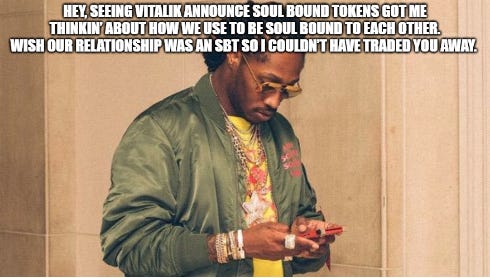Soul-Bound Tokens & FICO Scores
SBTs could become a decentralized alternative for centralized FICO Scores
In this post, we will talk about:
Decentralized Society (DeSoc)
Soul-Bound Tokens (SBTs) and what they are
How SBTs can be used for Lending & Borrowing
Earlier this month, Vitalik Buterin co-authored a paper describing his vision of a Decentralized Society, or what he refers to as “DeSoc”. One of the most interesting takeaways from this paper was the concept of Soul-Bound Tokens and how they can become a blockchain alternative for credit scores.
Crypto and web3 today are primarily focused on financialization and ownership of digital assets. However, building proper economic systems requires trust, especially when it comes to under-collateralized lending and borrowing. In the traditional finance system, FICO scores have become a representation of trust as a borrower. For example, when you apply for a residential mortgage loan, your FICO score will be used by the bank to determine your reliability of being able to pay the loan back.
This system contains many flaws. Centralized authorities assigning scores to determine whether you should be allowed to own a house sounds quite dystopian. Yet, this is how our world operates today. Moreover, many studies have shown that traditional FICO scores have embedded biases against racial minorities. The problem is even more persistent with immigrants or younger individuals who simply haven’t had enough time to build up their history as a borrower. Soul-Bound Tokens, or SBTs, can become a decentralized alternative to the FICO scores we have today.
Soul-Bound Tokens are decentralized crypto tokens that exist within crypto wallets. You can also think of them as an NFT. The crypto account would be referred to as a “Soul”, while the holdings inside it are the Soul-Bound Tokens themselves. SBTs can represent affiliations, memberships, education credentials, employment history, or even works of art such as writing or music.
The mechanism of SBTs would allow for users to self-certify their credentials - similar to how individuals can showcase their resumes when applying for jobs today. However, the power of blockchain technology and decentralized communities allows us to take this one step further. Counterparties, such as other individuals or even institutions, can verify credentials directly on the blockchain. The result is the emergence of a decentralized society where individuals can highlight their internet history for everything, starting from job opportunities to mortgage loans.
For example, Uncommon Cents could have a soul wallet from which each reader is given a Soul-Bound Token. This verifies subscription to our Substack and allows for a community to be built around this newsletter. Since SBTs would be publicly visible, readers can easily find each other across the internet. Similarly, an education institution can issue SBTs as a form of certification upon graduation. This would allow graduates to meet other alumni on the internet in a completely decentralized way.
In my opinion, this is ultimately the true potential of SBTs. They create a bridge between physical centralized communities and digital decentralized ones.
Using SBTs for Lending & Borrowing
As of now, decentralized protocols require high levels of collateralization for financing activities. The reason for this is quite simple - web3 has no way to verify credentials to gauge the reliability of a borrower. As a result, any business model that revolves around under-collateralized loans cannot operate in web3 today.
SBTs offer a potential solution to the problem. Since Soul-Bound Tokens can be used to represent education and work history, borrowers can use these to stake their reputation and secure a loan.
These loans can become forms of SBTs themselves, taking up a place inside the crypto wallet of the individual holding it. Once the loan is repaid, the token representing the loan can be burned or replaced with another token that shows proof of repayment. This way, securing a second loan becomes much easier for individuals who have been reliable borrowers in the past. The non-transferability of SBTs play a crucial role here, as exchanging these tokens across wallets would destroy their purpose in the first place.
This would lead to the creation of new lending and borrowing models within web3, and could potentially provide a much better alternative than centralized FICO scores. Additionally, SBT-based financing could be used for other activities as well. For example, individuals within a DAO can all pool and stake their reputations together to raise venture money for a project they want to create. The best part about it - all of this can be done in a completely decentralized manner over the blockchain.
Conclusion
Soul-Bound Tokens and DeSocs are still in their early stages of inception but have promising use cases within many verticals of society. If successful, it could become one of the most interesting applications of blockchain technology. I will be paying close attention to the development of SBTs in the future, and you probably should too.
To learn more, check out Vitalik Buterin’s paper on SBTs. Vitalik is the Founder of Ethereum, and he co-authored the paper along with E. Glen Weyl and Puka Ohlhaver.







Love the bionic reading!